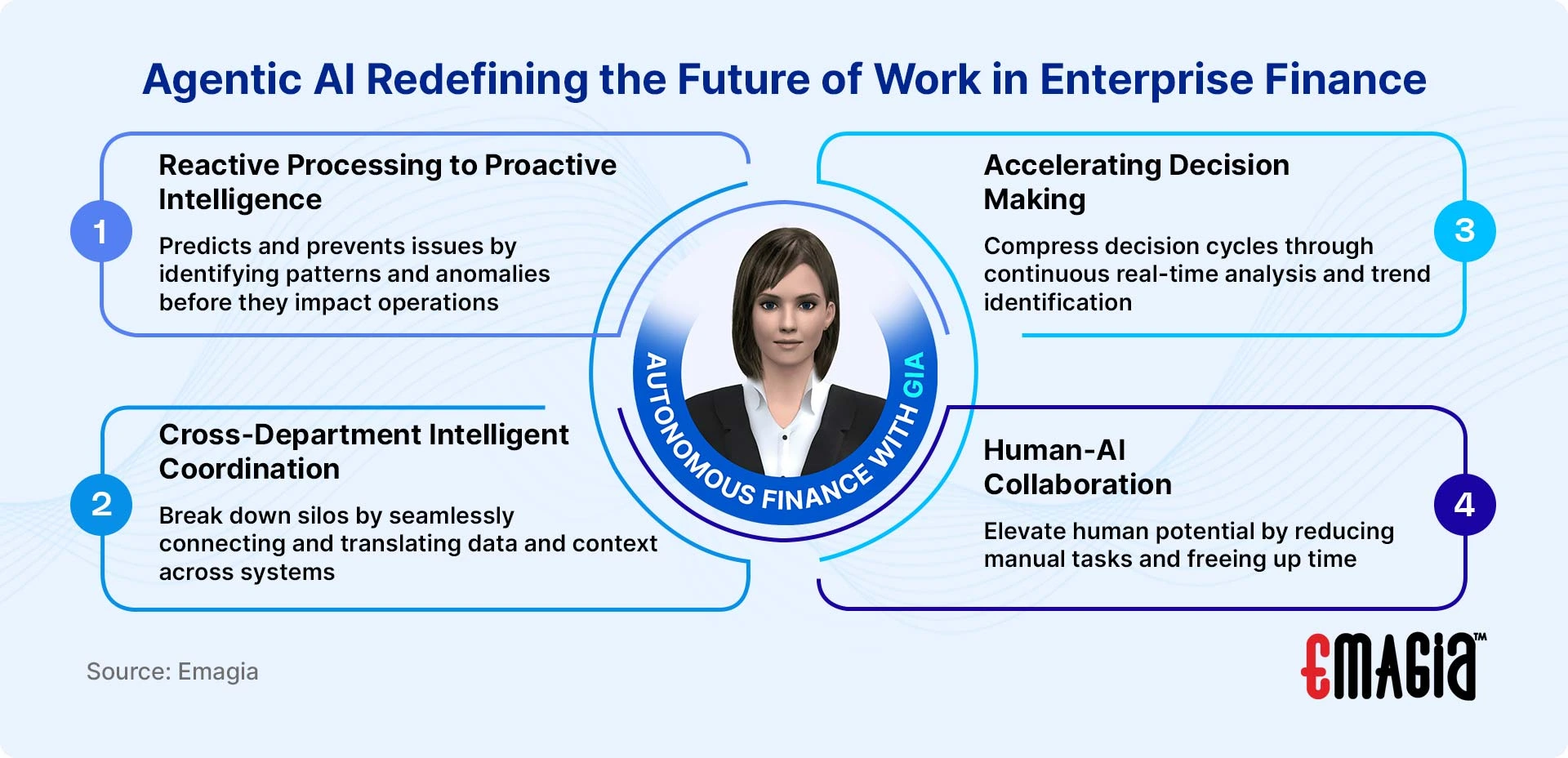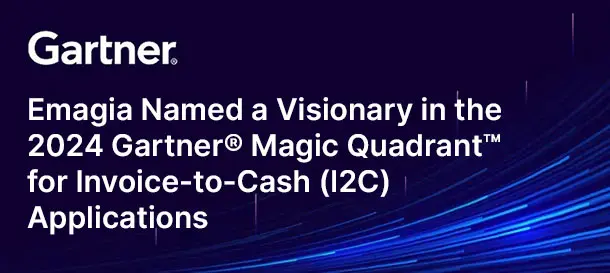Introduction: The End of “Digital Busywork” Is Finally Here
Most finance teams still spend a significant amount of their time on repetitive tasks. But that’s about to change dramatically. Gartner predicts that by 2029, one-third of finance staff will hold shared jobs, where AI and a person jointly share responsibility for performing a single role.
In this guide, you’ll discover how Agentic AI is redefining the future of work in enterprise finance, why it’s different from every AI solution you’ve encountered before, and the specific ways it’s revolutionizing enterprise finance operations. By the end, you’ll understand not only how Agentic AI is changing the workforce but also why forward-thinking finance leaders consider it essential for achieving a competitive advantage.
Agentic AI, Beyond Automation to Autonomous
The Evolution from Assistants to Digital Colleagues
Agentic AI represents a fundamental shift from AI as a tool to AI as an autonomous collaborator. Unlike traditional automation that follows pre-programmed rules, or even generative AI that responds to prompts, Agentic AI systems can:
- Understand complex intent beyond simple commands
- Prioritize and take initiative without human direction
- Coordinate seamlessly across multiple systems and departments
- Respond dynamically to changing conditions in real-time
- Learn continuously from feedback and improve performance over time
The Critical Difference: Goals vs. Tasks
Traditional automation executes tasks. Agentic AI achieves goals.
Consider the difference between a rule that says “send a payment reminder after 30 days” versus an AI agent with the goal of “optimize collection efficiency while maintaining customer relationships.” The agent might analyze payment patterns, customer communication preferences, economic conditions, and relationship history to determine the optimal timing, messaging, and channel for each customer interaction.
This goal-oriented approach means Agentic AI doesn’t just follow instructions; it interprets the goals and figures out the best path to achieve them.
How Agentic AI Is Redefining the Future of Work
From Reactive Processing to Proactive Intelligence
Traditional finance operations are largely reactive. Teams process invoices as they arrive, handle disputes after they’re raised, and analyze performance after the period closes. This reactive approach creates bottlenecks, delays decision-making, and often means problems are discovered too late to prevent them from occurring.
Agentic AI agents continuously monitor business processes, identifying patterns and anomalies to enhance operational efficiency. They don’t wait for month-end to flag cash flow issues; they predict them weeks in advance. They don’t just process disputed invoices; they analyze dispute patterns to prevent future issues.
Impact:
- Predictive Collections: AI agents analyze customer behavior, payment history, and external factors to predict which accounts are likely to become problematic, enabling proactive intervention
- Dynamic Credit Management: Instead of applying static credit limits, agents adjust credit terms in real-time based on changing customer circumstances and market conditions
- Intelligent Exception Handling: Rather than escalating every exception to humans, agents resolve routine issues autonomously and only involve humans for complex decisions
Breaking Down Departmental Silos Through Intelligent Coordination
Most enterprises struggle with disconnected systems and departments that lack effective communication. Sales doesn’t always inform finance about contract changes, procurement operates independently of accounts payable, and treasury makes decisions without real-time operational data.
AI agents can serve as intelligent connectors between departments, translating data and context across systems. They understand the implications of a sales contract change for billing processes or how a supply chain disruption affects cash flow forecasting.
Applications:
- Cross-Functional Workflow Orchestration: When a large customer places an urgent order, AI agents coordinate across sales, finance, procurement, and logistics to ensure optimal cash flow and delivery outcomes
- Intelligent Data Integration: Agents automatically reconcile data discrepancies between systems, flagging significant variances while resolving routine differences
- Contextual Decision Making: Agents consider inputs from multiple departments to make more informed decisions, such as adjusting payment terms based on both customer creditworthiness and current cash position

Accelerating Decision Cycles from Days to Minutes
Modern business operates at digital speed, but many finance processes still adhere to monthly or quarterly cycles. By the time analysis is complete and decisions are made, market conditions may have shifted dramatically.
Agentic AI compresses decision cycles by continuously analyzing data, identifying trends, and taking appropriate actions without waiting for human review cycles.
Impact:
- Dynamic Pricing Optimization: Agents adjust pricing and payment terms in real-time based on market conditions, customer behavior, and competitive intelligence
- Instantaneous Risk Assessment: Credit decisions that once took days now happen in minutes, with agents analyzing hundreds of data points to assess risk
- Adaptive Process Optimization: Agents continuously refine processes based on performance data, making incremental improvements that compound over time
Elevating Human Potential Through Strategic Focus
The conversation around AI in the workplace often frames it as a replacement discussion. However, the most successful implementations of Agentic AI treat it as a form of collaboration that can enhance their workflow, rather than a replacement.
When AI agents handle routine tasks, human professionals can focus on activities that require uniquely human capabilities, such as strategic thinking, relationship building, creative problem-solving, and complex decision-making.
The New Role of Finance Professionals:
- Strategic Advisors: With real-time data and AI-generated insights, finance professionals become trusted business advisors rather than just finance reporters
- Exception Managers: Humans focus on complex, high-value exceptions that require contextual understanding and judgment
- Innovation Drivers: Freed from routine tasks, teams can focus on process improvement, new business opportunities, and strategic initiatives
Implementation Considerations: Making Agentic AI Work
Starting with High-Impact, Low-Risk Applications
The most successful Agentic AI deployments begin with processes that are:
- Data-rich with clear patterns and exceptions
- Rules-based but requiring contextual decisions
- High volume to justify the investment
- Well-documented with clear success metrics
Building Trust Through Transparency
One key to successful Agentic AI implementation is maintaining transparency in AI decision-making. Modern agents can provide detailed explanations for their actions, helping teams understand and trust their AI colleagues.
Gradual Expansion and Learning
Rather than attempting to automate entire processes immediately, successful organizations start with specific tasks and gradually expand the responsibilities of their AI agents as confidence and capabilities grow.
How Emagia’s Gia Agent Orchestration Studio Enables Intelligent Work
Emagia’s approach to Agentic AI recognizes that every organization’s finance operations are unique. The Gia Agent Orchestration Studio allows finance teams to create, configure, and manage AI agents tailored to their specific processes and requirements.
Key Capabilities:
- No-Code Agent Creation: Finance professionals can build AI agents without technical expertise
- Seamless Integration: Agents work with existing ERP, CRM, and financial systems
- Intelligent Escalation: Agents know when to handle tasks autonomously and when to involve humans
- Continuous Learning: Agents improve performance based on feedback and outcomes
- Comprehensive Audit Trails: Full transparency and compliance for all agent actions
The platform treats AI agents as digital team members, with defined roles, responsibilities, and performance metrics, just like human employees.
Final Thoughts
The future of work in enterprise finance is not about replacing human judgment with artificial intelligence; it’s about empowering the human workforce with AI that can think, learn, and act autonomously. Agentic AI represents the next evolution in how work gets done, moving beyond simple automation to true collaboration between humans and intelligent systems.
For finance leaders, the question isn’t whether Agentic AI will transform their operations; it’s whether they’ll lead this transformation or be forced to catch up later. The organizations that embrace intelligent work today will define the competitive landscape of tomorrow.
The era of digital busywork is coming to an end. The era of intelligent work has begun.
FAQs
What is Agentic AI?
Agentic AI refers to artificial intelligence systems that can operate autonomously, make goal-oriented decisions, and adapt to changing conditions without constant human direction. Unlike traditional automation, these systems can understand intent, prioritize tasks, and learn from outcomes.
How is Agentic AI different from traditional automation?
Traditional automation follows pre-programmed rules to execute specific tasks. Agentic AI pursues objectives and determines the most effective methods to achieve them, adapting its approach based on context and learning from the results.
Is Agentic AI safe for financial operations?
When properly implemented with appropriate controls, audit trails, and human oversight, Agentic AI can improve the safety and compliance of financial operations by reducing human error and providing complete documentation of all actions.




